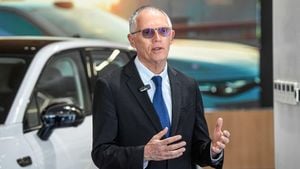World leaders and scientists gathered at the 29th United Nations Climate Change Conference, known fondly as COP29, held from November 11 to 19, 2024, at Baku, Azerbaijan, to negotiate and deliberate on pathways to combat climate change. Marked by both ambition and frustration, the conference culminated in the adoption of the New Collective Quantified Goal (NCQG) of $300 billion per year by 2035 for climate finance, stirring mixed reactions among stakeholders.
Historically, COP meetings have been characterized by tough negotiations, but as discussions commenced, it became apparent to developing nations observing the proceedings, often with bated breath, they were witnessing the familiar face of climate finance negotiations — intricately laced with political maneuvering. Developed nations entered the talks wearing their proverbial poker faces, hinting once again at the complex dynamics involving vested interests.
Initially, expectations were set high with the Group of 77+ China coalition demanding $1.3 trillion annually, aimed squarely at fostering adaptation and mitigation efforts in the face of growing climate disasters. Meanwhile, the outcomes of COP29 have led to widespread speculation — the climate finance goal had effectively been tripled from the previous ambition of $100 billion established back during COP21, held in Paris nearly ten years ago. Yet, as many advocates had pointed out, the goal fails to adequately address the urgent needs of the world’s most vulnerable communities.
“This climate finance deal is akin to offering someone with severe dehydration nothing more than a pipette to drink from when what they really need is an ocean,” stated Fred Njehu, from Greenpeace Africa, highlighting the inadequacy of the measures proposed. The reaction echoed throughout the halls of COP29 as voices from developing nations expressed discontent, deeming the agreement as merely scratching the surface of climate action.
Yet, beneath the headlines of milestones like the $300 billion aim, developing countries were left grappling with unpacking the caveats tied to the commitment. The mixed financing sources — both public and private, voluntary contributions, and potentially debt-incurring instruments — stained the accomplishment. Caroline Brouillette, executive director of Climate Action Network Canada, described the deal as "a band-aid on a bullet wound" — notable only for its glaring inadequacies.
It didn't take long before complications arose. Several countries took a cautious approach to their commitments, with many expressing concerns over whether clear stipulations would be established. Questions hung heavily over how the promised funds would be mobilized and where precisely they would originate. Would the money come from grants, concessional loans, or would the often difficult-to-access private funds dominate?
A spotlight was also cast on influential sectors within the negotiations — the fossil fuel industry. Despite calls to pivot away from fossil fuel dependency as outlined by the previous year’s UAE Consensus, progress toward such initiatives remained largely stagnant. Key players like Saudi Arabia and Russia reaffirmed their dedication to the fossil fuel market, muddying the waters for developing countries eager for substantive action on this front.
“The inability to secure explicit commitments on phasing out fossil fuels is nothing short of failure,” lamented representatives from the We Mean Business Coalition, as they underscored the setbacks against powerful oil lobbyists increasingly driving negotiations at the expense of needed climate action. Reports indicated over 1,700 fossil fuel lobbyists were present at COP29, overshadowing the voices advocating for meaningful commitment and shifting priorities toward sustainable energy.
Trapped within the walls of these heated negotiations were the voices advocating for loss and damage funding — mechanisms urgently needed for nations facing irreversible impacts of climate change. Despite the establishment of the Loss and Damage Fund at COP27, the commitments made during COP29 still fall woefully short of addressing the reality of climate-related disasters. Reports showed cumulative pledges to the fund amounted to just $731.15 million, markedly below the estimated $100 billion needed annually to tackle these growing challenges.
“What we see is disheartening,” noted climate activist Kelly Evers. “Developing nations continue to suffer from adverse impacts of climate change, and the quantitative figures seem to drift away from meeting real needs.” Advocates also emphasized the necessity for developed nations to not only contribute upfront but to align their finance frameworks with the realities experienced by vulnerable populations.
The conference also highlighted significant agreements, including new initiatives aimed at addressing food security and agricultural sustainability. For the first time, COP29 dedicated time and resources to discussing food systems, with new initiatives aimed at refining funding mechanisms for agricultural resilience. The Baku Harmoniya Climate Initiative for Farmers emerged from the conference as one potential avenue uplifting rural voices working toward sustainable agricultural practices.
Yet, with ambitious goals announced, many emphasized the need for actionable frameworks to back such measures. The underrepresentation of private-sector actors at COP29 drew ire from delegations from youth groups, who called for collaboration across generations. While many regarded the discussions as constructive, they found the absence of older generations — particularly private industry leaders — concerning.
“We need established leaders to take responsibility and work alongside us, rather than leaving younger generations to tackle these enormous problems without any resources or support,” remarked Yuhan Zheng, one of the youth ambassadors at the conference. Their insights shed light on larger interconnected topics of equity, accountability, and the demand for inclusivity at the negotiation table moving forward.
Returning the lens to the broader picture, the conference's outcomes have raised pressing questions about future action as COP30 arrives on the horizon, set to take place amid the rich backdrop of the Amazon rainforest. Observers expressed hope COP30 will re-energize commitments, particularly surrounding biodiversity and Indigenous rights, emphasizing the need for inclusive decision-making processes.
“Humanity has the capacity to be more than just consumers; we can collaborate, learn from centuries-old wisdom, and create pathways forward for us all,” noted activist Bodhi Patil. The upcoming conference offers promises for renewed focus, addressing not only climate action but also opportunities to address which communities have historically been silenced.
Despite the myriad challenges faced during COP29, as well as palpable setbacks revealed during discussions, the need for collective action remains stronger than ever. Summation can often become contentious, yet as COP29 draws its curtains, the call for transformative engagement echoes through the air — signaling perhaps the dawn of renewed action or the bitter realities of political theater within climate negotiations. Only time will reveal which path the world will take as the climate crisis marches onward, seemingly undeterred by politics.



